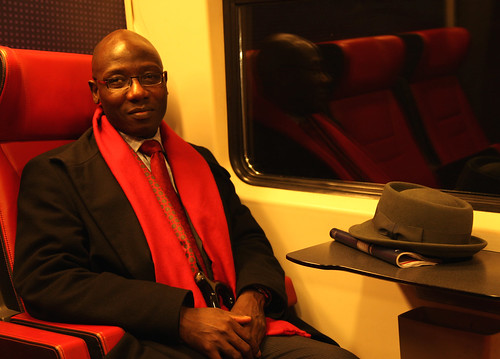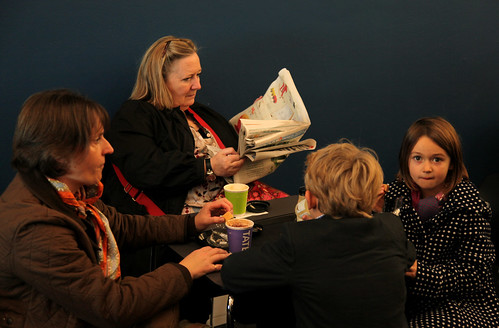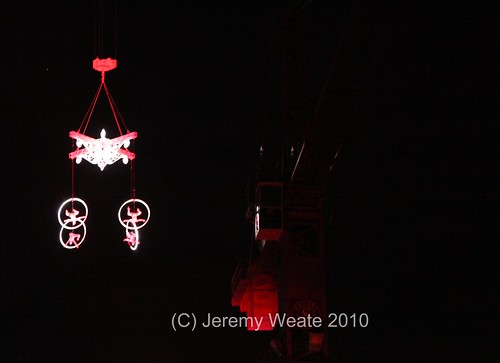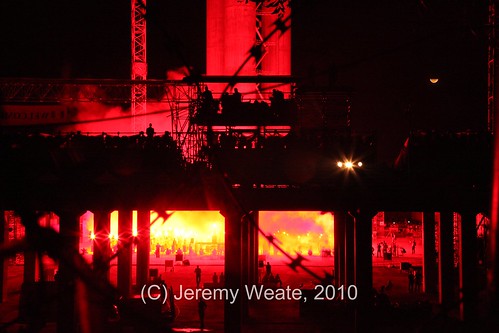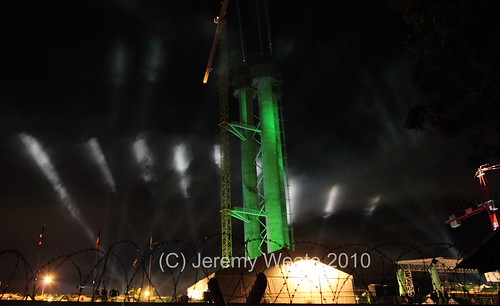Friday, October 29, 2010
Tuesday, October 26, 2010
Friday, October 22, 2010
Felasophy
An interesting short doc on Abami Eda featuring Sandra Isadore - the woman who brought Fela to political consciousness in the late 1960s, here.
Read more...Thursday, October 21, 2010
Monday, October 18, 2010
Remembering Fela, an interview with Carlos Moore
As Nigeria says farewell to Carlos Moore, I have republished an interview with Carlos from a couple of weeks back in the Guardian here.
Read more...Saturday, October 16, 2010
Friday, October 15, 2010
ITT
Good post on the Tax Justice Network's blog about the origins of the recent Global Witness report on how British banks act in complicity with corrupt Nigerian officials. Here. Thanks to Tayo the linkmeister for the URL.
Read more...Thursday, October 14, 2010
33 Nigerian miners trapped underground
"Last night I dreamt that 33 Nigerian Miners were trapped underground and the govt sent a capsule down to rescue them one after the other, but the rescue had to be called off as the trapped miners could not agree amongst themselves on who goes first. Zoning was suggested but they could not agree on which zone will go first. Eventually in a struggle to all board at the same time, the capsule was :leading to the attempt being called off.
Oh dear. Sorry it was only a nightmare. In fact the real problem was that FEC awarded the capsule contract to Ibori and we are still awaiting delivery 3 mths later. There is a probe going on to unravel this and retrieve the award sum before we get to the issue of what formula to adopt for the rescue and which miner comes out first. Meanwhile traditional rulers from the miners' towns are paying solidarity visits to the President to thank him for his efforts to rescue the miners.
And the First lady has just invited the wives of the Nigerian miners to Abuja for dinner at the Hilton to honour them! At this meeting, they will pray for the good Lord to rescue the miners. The first lady will lead prayer warriors into battle to attack the devil and enemies of Nigeria, whose wicked acts are constituting an obstacle to the rescue efforts. The first ladies from the 36 states will also be in attendance. All including the wives of the miners will wear the Goodluck for President Ankara.
Wednesday, October 13, 2010
Tuesday, October 12, 2010
Missing the one who carried Death in his Pouch
The conversation was profoundly moving. Although Fela was present in the gathering, having been called down by the searing Ewi singing, his absence was just as keenly felt. Read more...
GT the Guitar Man at the Life House/Carlos Moore Book Party
GT the Guitarman has a sublime falsetto voice - its hard to imagine him not going stellar. He rocked the Life House on Sunday. Here for more. Read more...
Review of Louis Theroux in Lagos
...."His first meeting was with an area boy called Tawa, who proved, upon closer inspection, to be a girl. Her authority rests in her union ID card and her ability to fight "like a man".
Louis may be a master of faux-naive inquiry, but in Lagos he encounters several connoisseurs of the freely given but totally disingenuous answer. When he asks why Tawa's terrifying second-in-command seems reluctant to talk about the enormous corkscrew scar running up one side of his head, someone says, with a cold smile, "I don't know. Maybe his past is haunting him."
Here.
Monday, October 11, 2010
Friday, October 08, 2010
Thursday, October 07, 2010
Where Kenya leads, Nigeria must follow
The story of the 1,000 Kenya teachers sacked for sexually abusing minors is disturbing yet welcome news. No one looking in on the development from Nigeria can deny the issue is just as prevalent here and needs to be addressed urgently. This would require a joined-up effort between the State Ministries of Education and the police, using the Child Rights Law where it has been implemented. Kenya has given children suffering in silence hope. The Nigerian directive should of course be extended to tertiary level, where sexual abuse (for accommodation as well as for grades) seems at times to be the norm rather than the exception. Teachers who are found guilty should be prosecuted, and banned from teaching for life. Its time to say no more, and thank Kenya for taking the lead.
Read more...Youtube Nigeria goodies
The Colonial Legacy (excellent documentary series commissioned by the IBB Govt - marred slightly by poor quality audio & video. Ade Ajayi provides a firm counter to colonial apologist Anthony Kirk-Greene):
Part 1
Part 2
Part 3
Part 4
The Legacy of Empire (BBC two-parter featuring John Smith, ex-Colonial Officer)
Part 1
Part 2
My Country (Funmi Iyanda on Nigeria)
Part 1
Part 2
Part 3
Thanks to Rosemary Ajayi of 419Positive for all the links.
Louis Theroux with KAI in Lagos
As usual, legal restrictions on the iPlayer mean no one except viewers in the UK will be able to watch the show. The BBC's licensing structure is increasingly belonging to the wrong century. Read more...
Wednesday, October 06, 2010
The Yoruba Institute in Brasil....
The holders of the culture, thousands of miles from home. Perhaps one day, the culture will return home and find less ambivalence and confusion..
Read more...Bino and Fino - pilot launches tomorrow
Zoning the Presidency to women
Let's face it, Nigerian men have messed up politics. Isn't it time the Presidency was zoned to women, asks Max Siollun..
Read more...The power of the tweet
Malcolm Gladwell is off the pace. Perhaps context is everything when it comes to the power of social media, and its amphetamine-fuelled upstart, Twitter. In the US and the West in general, hot news stories are quick to break, with most angles to a story covered relentlessly until the next news break hits the shore. Helicopters take to the air, talk show hosts take calls, the 24 hour news cycle throws resource at the scene, pundits are summoned to the studios..
Things play out quite differently in other parts of the world. Take the recent tragedy of 1-10, here in Abuja. The news warning of a bomb threat from MEND came through Twitter (just minutes after Jomo Gbomo's email was sent). The news of the explosions (first in Eagle Square, then down the road) came through Twitter, from eyewitnesses using their mobile phones. The fastest global news Twitter feed of them all - Breaking News - was onto the story within a few minutes. The news that people had been killed came through Twitter. Bodies were 'seen' first on Twitter. As the terrestrial TV stations went into news blackout mode (showing only the fly past and calisthenics displays), the story developed - on Twitter, backed up by Facebook (although this was much slower and more sluggish), sms, BBIM and voice. Those looking in from conventional media sources overseas, including CNN and the BBC, had to remind twitterers to continue using the correct hash tags so they could follow events. They were powerless to lead on the news - plane tickets had yet to even be bought.
Even now, as the aftermath lurches from one side to the other, from Abuja to Jo'burg to Minna and back to Abuja again, Twitter is eons faster at pinpointing where on the radar the next aspect of the story is emerging from and way faster on follow-up than conventional news media. In Nigeria at least, the revolution most likely won't be televised, but it may well be on Twitter.
Tuesday, October 05, 2010
Maradona
Still, Maradona came out looking good - it seemed that the dark days of drug abuse and weight gain were behind him. Argentina ultimately left their mark on the finals. A new contract was issued... and then retracted. Who knows what will happen to him now? England fans will never forgive those cunning hands, all the same. Someone who has for so long dominated his country and appeared to be part of the landscape itself exits stage left. How the mighty are fallen. Read more...
Monday, October 04, 2010
The master and the slave
Public lecture tomorrow on elections & democracy in Africa
Peter R. Claussen, Counselor for Public Affairs
Nigeria: a drama in six Acts
Good historical piece by Dr Adekeye Adebajo in the Mail and Guardian.
Read more...Dickens in Lagos
George Packer wonders when the Great Lagos Novel will be written. Here.
(Grazie a Tayo) Read more...
The Amnesty programme
Just two weeks' training with huge class sizes, skills acquisition centres yet to be built, no job creation strategy. At present, its hard to see the Amnesty Programme for ex-militants as a success, judging from this BBC report.
Read more...Sunday, October 03, 2010
Independence blues...
Eight writers on the meaning of Independence in today's NEXT on Sunday.
Read more...Friday, October 01, 2010
Today's Tragedy in Abuja
Last night we had a group of friends round for dinner to celebrate my 41st birthday. Without trying to sound smug, I am fortunate to count some keen minds as mates, who never fail to impress in their analysis of their beloved country, Nigeria. But, just now, it seems that no one really knows what is going to happen – both with the elections, and more generally, with Project Nigeria. After the party, at midnight, we headed down to the area near Millennium Tower, a half-completed building site near the National Mosque. From behind razor wire, we looked on at the celebrations an invited few dignitaries were privileged to watch. I was filled with a sense of sadness that yet again, ordinary Nigerians were being excluded from the main event.
Fifty's Eve
After the party, we all drove to the building site renamed as Millennium Tower for the day – a wasteland of concrete and ditches near the National Mosque with huge columns testifying to something quarter-built. We arrived just after midnight – and had apparently missed the fireworks. Some said they had cost a million dollars, although those that had seen them said they didn’t last long.
